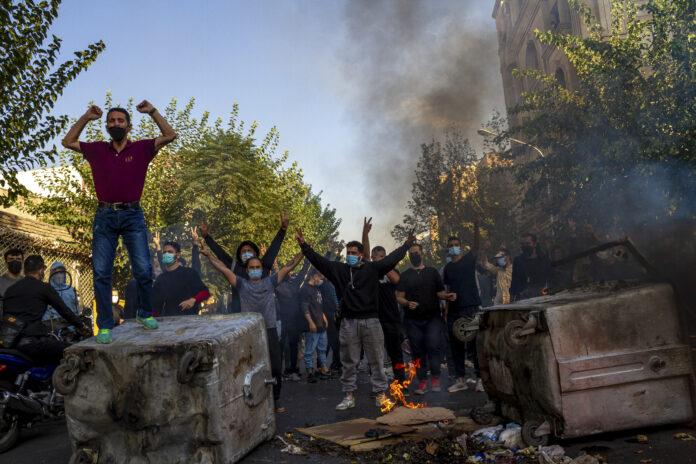The European Union and Britain on Monday imposed sanctions on two Iranian ministers and several senior police and military officials, including members of Iran’s Revolutionary Guard, over their alleged roles in the security crackdown against massive anti-government protests.
Iranian women – and some men – have been protesting the government’s severe restrictions on their daily life since late September after the death of 22-year-old Mahsa Amini following her arrest for allegedly violating the Islamic Republic’s strict dress code.
“The EU strongly condemns the unacceptable violent crackdown of protesters. We stand with the Iranian people and support their right to protest peacefully and voice their demands and views freely,” EU foreign policy chief Josep Borrell said after the bloc’s foreign ministers endorsed the sanctions.
The move will see asset freezes and travel bans imposed on 29 Iranian officials, including Interior Minister Ahmad Vahidi, who the EU says is “responsible for serious human rights violations in Iran” due to police actions during the protests.
The EU also targeted Iranian state television broadcaster Press TV, saying it was “responsible for producing and broadcasting the forced confessions of detainees.”
1:56
Iran schoolchildren reportedly killed for protesting
In what appeared to be a coordinated move, Britain also said Iranian Communications Minister Issa Zarepour and several local law enforcement and Islamic Revolutionary Guard Corps officials would face similar restrictions in the U.K. for their roles in the protest crackdown.
Zarepour and the head of Iran’s Cyber Police, Vahid Mohammad Naser Majid, were targeted “for shutting down the internet in Iran, including disabling Whatsapp and Instagram, and banning the use of the Google Play app and Virtual Private Networks (VPNs),” a statement said.
It noted that 22 other Iranian political and security officials were also listed in the U.K. over the “brutal violence aimed at protesters.”
The EU called on Iran to end the violence, free those detained, allow a free flow of information, including via the internet, and demanded an independent investigation into Amini’s death. It’s the second raft of sanctions the 27-nation bloc has imposed on Iran over the protests.
Trending Now
Ontario emergency departments told to prepare for ‘extreme surge’ in demand
A ‘perfect storm’ has more Canadians surrendering pets. Here’s how to help
In a broadcast earlier Monday, French President Emmanuel Macron praised the women of Iran for making their voices heard.
“Women in Iran fight this fight with exceptional courage under the threat to their lives and the lives of their loved ones,” Macron told public radio FranceInter.
Their rebellion against the cleric-led state has “burst the ideological bubble” that Tehran has been sending to the world, Macron said, namely that Iranians don’t want Western values and that women there “were somehow happy to live in this constant state of obstruction.”
0:36
U.S. fears Russia may be advising Iran on how to suppress ongoing protests
His comments were recorded after his meeting Friday in Paris with four activists campaigning for Iranian women’s rights from exile.
Iran Foreign Ministry spokesman Nasser Kanaani blasted Macron for meeting with the activists, who included two U.S.-based Iranian dissidents, Masih Alinejad and Ladan Boroumand. Kanaani on Monday warned Macron that supporting Iranian dissidents “whose true nature is known by the Iranian people” is a “wrong, short-sighted policy” that could endanger France’s “long-term interests” in the region.
The EU also on Monday imposed sanctions on the chief of Iran’s Revolutionary Guard, the corp’s Aerospace Force and a company making drones that the bloc says have been used by Russia in its war against Ukraine.
Ukraine’s western-reinforced air defences are making it difficult for Russian warplanes to operate, and killer drones are a cheap weapon that can seek out and destroy targets while spreading fear among both troops and civilians.
Russia stands accused of sending waves of Iranian-made drones over Ukraine to strike at power plants and other key infrastructure. The EU says it has evidence that Iran has sold drones to Russia since the war began in February. It is investigating reports that Iran might also be supplying missiles.
In a statement, the EU said it was targeting Revolutionary Guard chief Gen. Hossein Salami because the corps “supervises the development of Iran’s Unmanned Aerial Vehicle (UAV) program as well as the transfer of UAVs abroad.”
The bloc also slapped sanctions on the Revolutionary Guard’s Aerospace Force and commanding general, saying that the Shahed-136 and Mohajer-6 drones they have allegedly supplied “are used by the Russian Federation in the war of aggression against Ukraine.”
Qods Aviation Industries, which makes Mohajer-6 drones, was also listed “for supporting materially actions which undermine or threaten the territorial integrity, sovereignty and independence of Ukraine.”
Last month, the EU imposed an asset freeze on Shahad Aviation Industries, and an asset freeze and travel ban on three armed forces generals suspected of links to Iran’s drone program.



